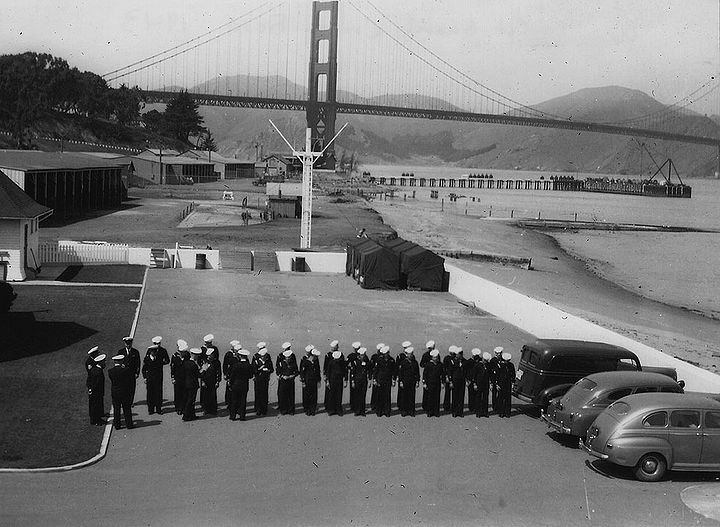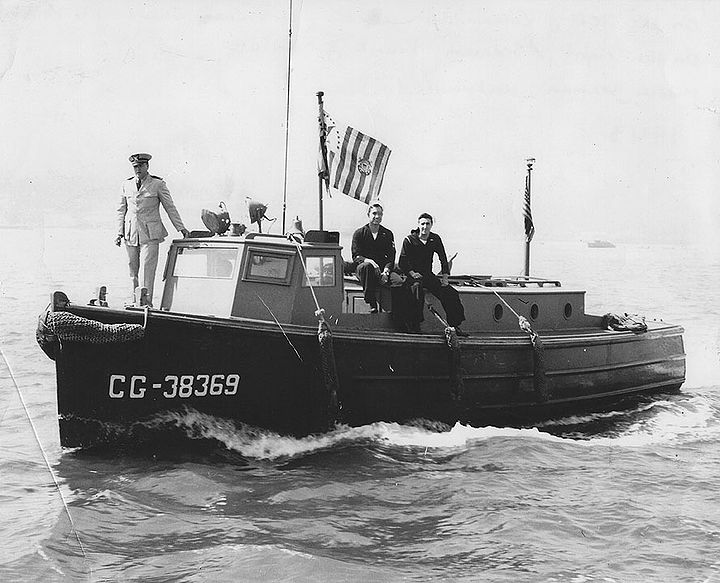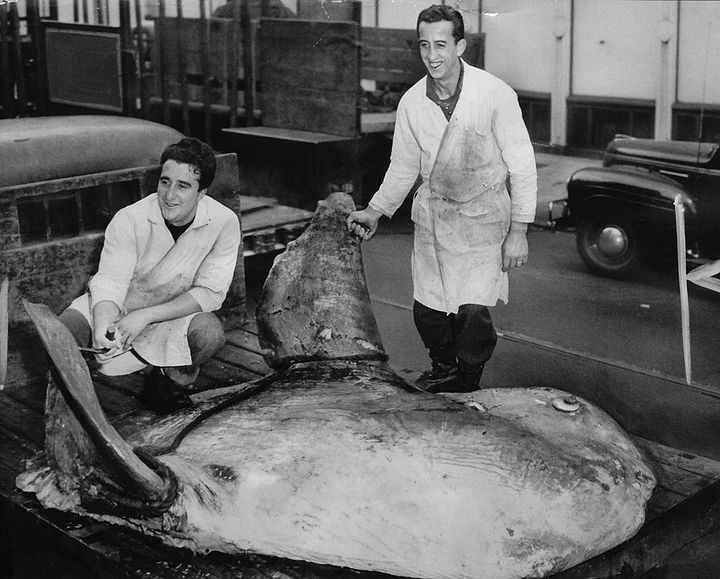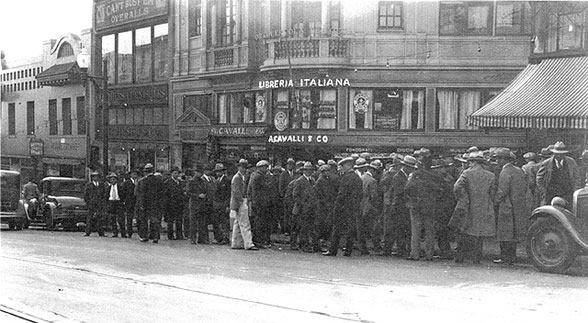Italian Fishing Ban WWII: Difference between revisions
(Created page with ''''<font face = Papyrus> <font color = maroon> <font size = 4>Historical Essay</font></font> </font>''' ''from Portwalk No. 15, an historical walking tour of Fisherman's Wharf''...') |
(added link to new article) |
||
| (4 intermediate revisions by 2 users not shown) | |||
| Line 3: | Line 3: | ||
''from Portwalk No. 15, an historical walking tour of Fisherman's Wharf'' | ''from Portwalk No. 15, an historical walking tour of Fisherman's Wharf'' | ||
Because Italy was at war with the United States during World War II, all non-citizen Italians were banned from working and living near the coast and were not permitted within 14 blocks of Fisherman's Wharf. Although this ban was not as drastic as the [[Japanese in Western Addition|internment of Japanese Americans]], it caused great upheaval and protest in the Fisherman's Wharf community, which was made up largely of Italian families, and the ban was lifted in less than a year. | Because Italy was at war with the United States during World War II, [[Columbus Day Which Will Live in History: October 12, 1942|all non-citizen Italians were banned from working and living near the coast]] and were not permitted within 14 blocks of Fisherman's Wharf. Although this ban was not as drastic as the [[Japanese in Western Addition|internment of Japanese Americans]], it caused great upheaval and protest in the Fisherman's Wharf community, which was made up largely of Italian families, and the ban was lifted in less than a year. | ||
<iframe src="https://archive.org/embed/ItaliansInSFDuringWWII" width="640" height="480" frameborder="0" webkitallowfullscreen="true" mozallowfullscreen="true" allowfullscreen></iframe> | <iframe src="https://archive.org/embed/ItaliansInSFDuringWWII" width="640" height="480" frameborder="0" webkitallowfullscreen="true" mozallowfullscreen="true" allowfullscreen></iframe> | ||
'''Regina and Josephine Alioto describe the fraught relationship of | '''Regina and Josephine Alioto describe the fraught relationship of Italians without U.S. citizenship (and therefore "enemy aliens" during WWII) to fishing off the Golden Gate. Frank Alioto, father to Regina and husband to Josephine, is at the heart of their story about the coast guard and the regulation of access to fishing during that time.''' | ||
''Video: Shaping San Francisco'' | ''Video: Shaping San Francisco'' | ||
| Line 22: | Line 22: | ||
''Photo: Alioto family'' | ''Photo: Alioto family'' | ||
[[Image:A Coast Guard motor lifeboat provides escort to San Francisco's crab fishermen as a wartime precaution. Ann Rosener 8b08560v.jpg|720px]] | |||
'''Coast Guard motor lifeboat escorting San Francisco's crab fishermen during WWII.''' | |||
''Photo: Ann Rosener, Library of Congress'' | |||
[[Image:Italian fishermen gathered on Fisherman's Wharf. San Francisco, California December 1941 8c33672v.jpg|720px]] | |||
'''Italian fishermen gathered on Fishermen's Wharf, December 1941.''' | |||
''Photo: Dorothea Lange, Library of Congress'' | |||
[[Image:San Francisco, California. Fisherman's wharf September 1943 Ann Rosener 8d31937v.jpg|720px]] | |||
'''Fishermen's Wharf, September 1943.''' | |||
''Photo: Ann Rosener, Library of Congress'' | |||
| Line 38: | Line 56: | ||
''Photo: Alioto family'' | ''Photo: Alioto family'' | ||
[[category:Italian]] [[category:military]] [[category:1940s]] [[category:1930s]] | [[Image:Italian Americans listen to Italian radio broadcasts of fascist Benito Mussolini on Columbus and Broadway from Roger Rubin FB.jpg]] | ||
'''Italian Americans listen to Italian radio broadcasts of fascist Benito Mussolini on Columbus and Broadway, early 1930s.''' | |||
''Photo: Roger Rubin via Facebook'' | |||
[[category:Italian]] [[category:military]] [[category:1940s]] [[category:1930s]] [[category:Fisherman's Wharf]] [[category:North Beach]] | |||
Latest revision as of 12:22, 21 November 2024
Historical Essay
from Portwalk No. 15, an historical walking tour of Fisherman's Wharf
Because Italy was at war with the United States during World War II, all non-citizen Italians were banned from working and living near the coast and were not permitted within 14 blocks of Fisherman's Wharf. Although this ban was not as drastic as the internment of Japanese Americans, it caused great upheaval and protest in the Fisherman's Wharf community, which was made up largely of Italian families, and the ban was lifted in less than a year.
<iframe src="https://archive.org/embed/ItaliansInSFDuringWWII" width="640" height="480" frameborder="0" webkitallowfullscreen="true" mozallowfullscreen="true" allowfullscreen></iframe>
Regina and Josephine Alioto describe the fraught relationship of Italians without U.S. citizenship (and therefore "enemy aliens" during WWII) to fishing off the Golden Gate. Frank Alioto, father to Regina and husband to Josephine, is at the heart of their story about the coast guard and the regulation of access to fishing during that time.
Video: Shaping San Francisco
The U.S. Coast Guard mustering for duty in 1943 at Crissy Field, Frank Alioto among them.
Photo: Alioto family
Frank Alioto sits with fellow crew member, commander at bow of Coast Guard cutter, during WWII on San Francisco Bay.
Photo: Alioto family
Coast Guard motor lifeboat escorting San Francisco's crab fishermen during WWII.
Photo: Ann Rosener, Library of Congress
Italian fishermen gathered on Fishermen's Wharf, December 1941.
Photo: Dorothea Lange, Library of Congress
Fishermen's Wharf, September 1943.
Photo: Ann Rosener, Library of Congress
Forbidden to Fish
Although they had lived here for decades, many of San Francisco's Italian fishermen were not citizens. Labeled "enemy aliens," approximately 1,400 Italians were forbidden to fish. The U.S. Navy confiscated 650 Italian-owned fishing vessels until the end of the war.
Dominic Dimaggio:
"I was not the only son who came home from the war to find that their parents, or other members of their family, had suddenly become enemy aliens. I remember my father was forbidden from fishing or even visiting his friends at the wharf because it was in a prohibited zone. I do not know the extent, but I am sure my father was changed after his experience as an enemy alien. The number of people affected by these events will never be known and the effect on the Italian American community can never be measured." (excerpted from testimony, US Senate Judiciary Committee, Oct. 25, 1999).
Before WWII during the late 1930s, Frank Alioto (squatting at left) and a coworker were photographed with this huge sunfish.
Photo: Alioto family
Italian Americans listen to Italian radio broadcasts of fascist Benito Mussolini on Columbus and Broadway, early 1930s.
Photo: Roger Rubin via Facebook







